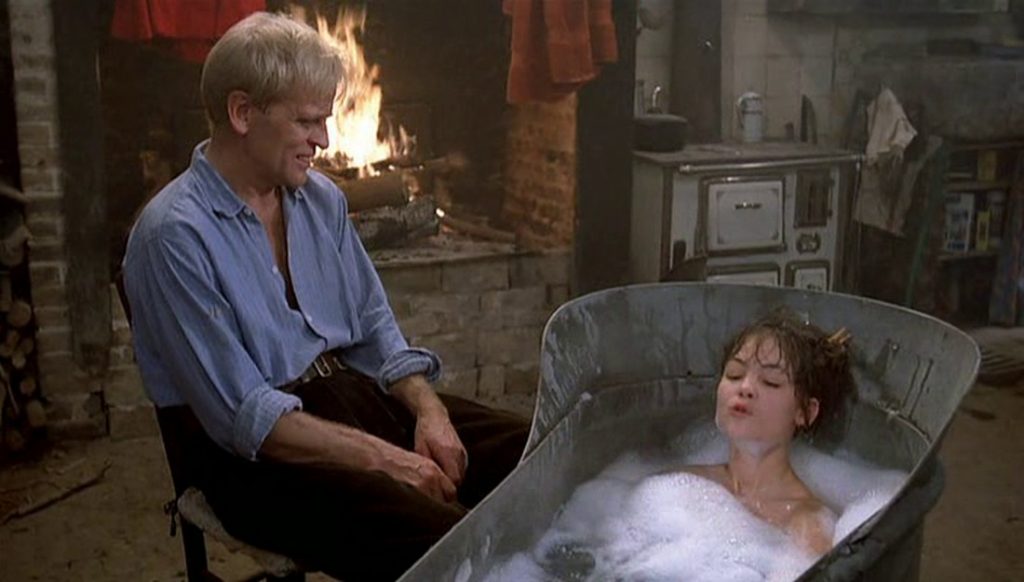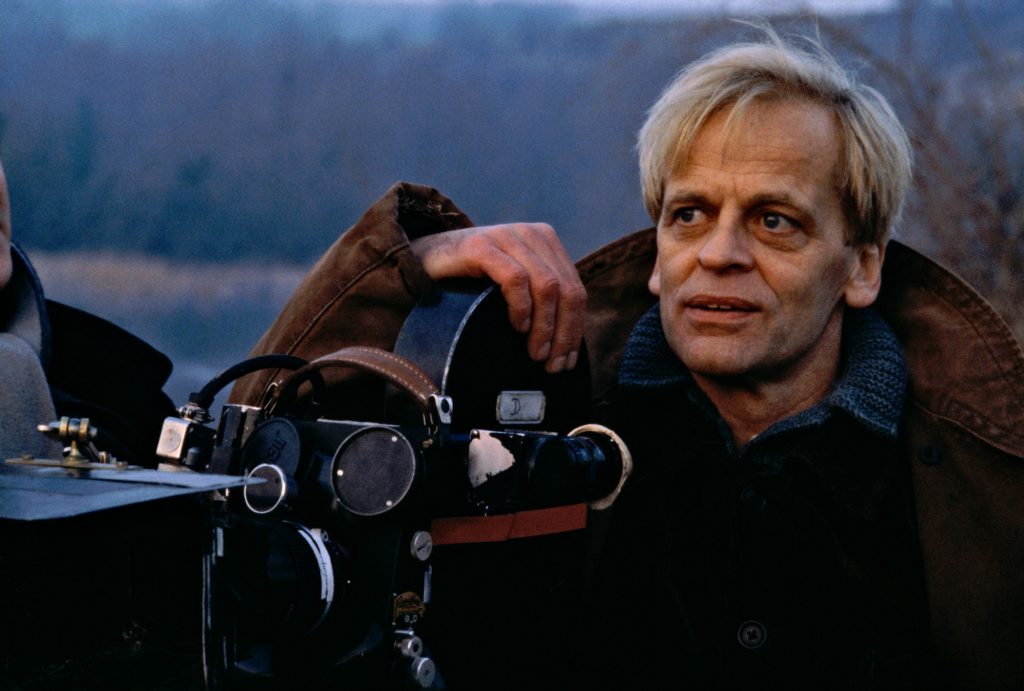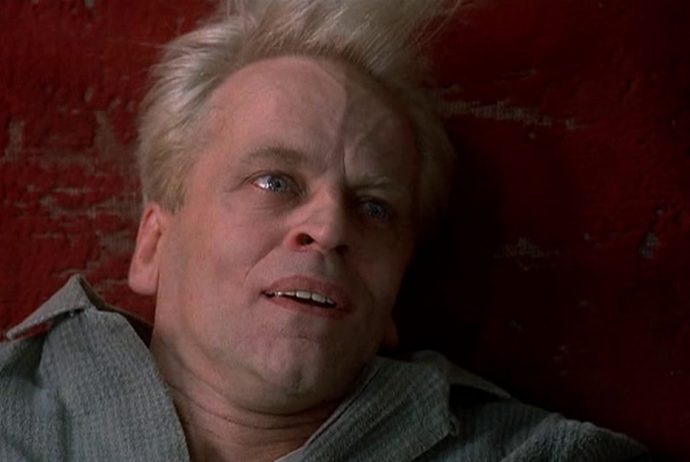Dir: Raphaële Billetdoux
Star: Pénélope Palmer, Klaus Kinski, Hélène Surgère, Michel Robin
Time and subsequent events have not been kind to the story here. Even when it was made, the idea of an adult man having a relationship with a 11-14 year-old girl was clearly problematic, regardless of its nature (and we’ll get to that in a bit). The subsequent accusations by Klaus’s daughter, Pola, that he sexually abused her from the ages of five to nineteen, add an unwelcome resonance to proceedings. Admittedly, it’s not something writer-director Billetdoux – who, incidentally, is a woman – could have foreseen coming out of the woodwork, more than thirty years later. However, watching scenes such as Klaus flat-out staring at the girl as she takes a bath… Well, if you don’t feel a bit uncomfortable, you’re made of sterner stuff than I.
Yet that may also be part of the point here. The film’s title translates as “The woman-child”, but you could argue that it might just as well be called “The man-child”. For Kinski’s character, Marcel, seems to be behind his chronological age, as much as the other half in the relationship, Élisabeth (Palmer), seems to be advanced ahead of her years. Initially, they are in some ways a match, both being starved of affection. But in the three years over which this takes place, Élisabeth matures, and leaves Marcel behind, emotionally and intellectually, as well as geographically. The realization of this destroys him, and leads to a tragic conclusion, in which she rejects her own family, telling her father (Robin), “Your slap is four years too late, and your kisses too.”
The film is, deliberately, ambivalent as to whether or not there is a sexual component (be that physical or mental) to the relationship between Élisabeth and Marcel. When she takes a bath in front of him, it’s with a complete lack of self-consciousness, as if he were a little brother. But his intense focus on her, as noted above (and shown below), is unsettling. On the other hand, there is also a scene where she puts lipstick on before going to see Marcel, and pouts at him. His reaction? He slaps her across the face. Yet, another sequence has her trying on petticoats and swirling them in his face, to Marcel’s obvious delight that, shorn of context, would reek of pedophilia. It’s all maddeningly inconsistent – again, I suspect, intentionally so.

The film draws a parallel between Élisabeth and the mythical Lorelei of German legend. In school, there’s a discussion of Heinrich Heine’s poem and it’s meaning: “Loreleï, is a very beautiful young lady. She swims, and she sings too… The men bewitched by her often lose sight of the water… This wonderful lady will cause their death, leading them to perdition.” It proves to be Élisabeth’s musical talents which cause Marcel’s downfall. For they lead her to move away, to a musical conservatory in Lille, triggering his collapse, when he believes she has abandoned him.
Making motivation and intent harder to discern, Marcel is completely mute. Yes, Klaus doesn’t say a single word over the course of proceedings. It makes for a challenging role, and you can see the appeal of it, especially to someone like Kinski, bored with more normal parts. It is a limitation that literally robs the actor of his voice. Instead, he is forced to use his eyes and his hands to put over his internal emotions, and also to communicate with Élisabeth. If a good demonstration of his theatrical talents, it feels like you are watching a chained-up tiger. The results are, inevitably, one-sided. And since that side belongs to a prepubescent child of limited acting experience (though Palmer made her debut at the age of three months, in one of Andy Warhol’s Screen Test series), the results leave a bit to be desired.
The shooting is one long battle against the aggressive obstinacy of the “directress” bitch and her clod of a cameraman – and the two of them stick solidly together in their obduracy.
All I Need Is Love, p.258

As the above suggests, Klaus was unhappy with several aspects of filming. Firstly, the location in the Somme (specifically, the village of Bovelles), about which he wrote, “I don’t think there’s a nastier and more suicide-inducing region in France than the area this director bitch has chosen for the flick. It’s near Belgium. Brutal and insidious, and now, in November and December, it’s gray and bleak, with a freezing slush. Fog, snow, and icy roads.” Then there’s the hotel accommodations: “The so-called deluxe ‘Turkish’ baths, with their huge, round plastic tubs where you could easily drown, function as follows: If you flush the toilet, shit and piss well up from the bathtub drain. If you turn on the cold-water faucet, out comes boiling water that stinks of shit. And so on. It’s a Laurel and Hardy flick. This so-called luxury chateau is used by Parisian men and their whores as a weekend brothel.”
But that pales into insignificance compared to his views on Billetdoux. His opinions on having a female director (my initial instinct is for the only time?) don’t exactly appear progressive, shall we say: “The first thing I think of is fucking this director. That would be something new!” On the other hand, one can perhaps forgive Klaus for that, since “Our discussions about the shooting take place on a bed”. Even though “she insists on remaining fully dressed,” that seems like a needless provocation. Was Billetdoux not aware of Kinski’s ferocious reputation? The actor was thoroughly unimpressed. “It takes me forever to grab a piece of her ass, forget about her cunt. She’s not only dumb and has no talent whatsoever, but is also stubborn.” None of the above paragraph made it into Kinski Uncut.
Regardless of his opinions about Billetdoux, you can’t deny Kinski, as usual, delivered the goods with his performance. Nothing sums this up more than the scene where Élisabeth goes to spy on Marcel, in his job as gardener/farmer on a local estate, and watches him tending to a cow. Any normal actor might have been content to feed the cow, perhaps slap it on the rump. Not Klaus, who buries himself up to the shoulder in its digestive tract. And not from the front end, either. Such commitment to his craft, can only be admired.
